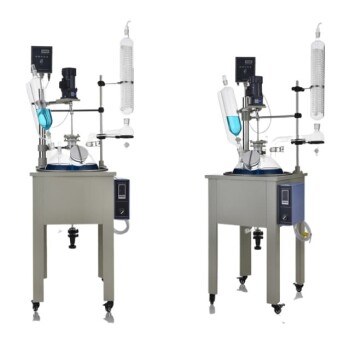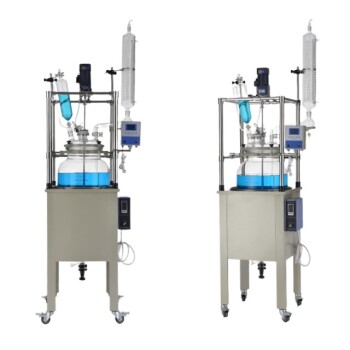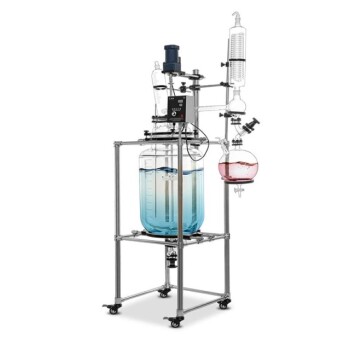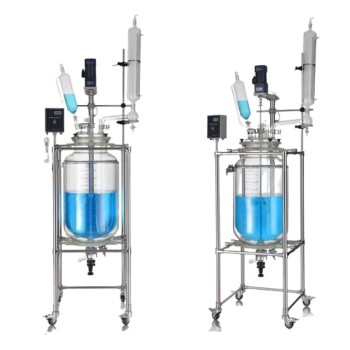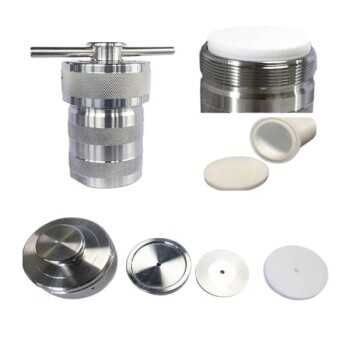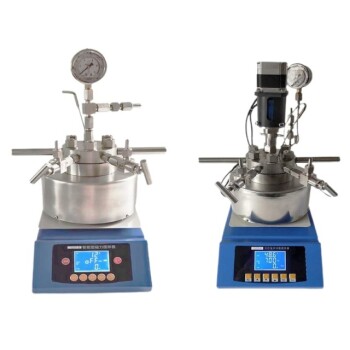A glass reactor is a versatile piece of equipment widely used in industries such as chemical, pharmaceutical, and biotechnology. It facilitates various chemical processes by providing a controlled environment for reactions, including temperature, pressure, and stirring control. Glass reactors are transparent, allowing for easy monitoring of reactions, and they can accommodate a range of accessories like stirrers, condensers, and thermometers. They are suitable for a wide array of applications, including high-temperature reactions (up to 300℃), low-temperature reactions (down to -80℃), vacuum-based reactions, solvent synthesis, distillation, reflux, extraction, crystallization, and purification. Their adaptability and transparency make them indispensable in chemical research, industrial chemistry, and educational settings.
Key Points Explained:

-
Definition and Purpose of a Glass Reactor:
- A glass reactor is a vessel made of glass designed to facilitate chemical reactions under controlled conditions.
- Its primary purpose is to provide a transparent, chemically resistant environment for conducting experiments and industrial processes.
-
Key Features:
- Transparency: The glass construction allows for visual monitoring of reactions, which is crucial for observing changes in color, phase, or other visual indicators during a reaction.
- Temperature Control: Glass reactors can operate at a wide range of temperatures, from -80℃ to 300℃, making them suitable for both low-temperature and high-temperature reactions.
- Pressure Control: They can operate under vacuum conditions, enabling negative pressure reactions, which are essential for processes like distillation and extraction.
- Accessory Compatibility: The reactor lid is designed to accommodate various accessories such as stirrers, condensers, and thermometers, enhancing its functionality.
-
Applications:
- Chemical Synthesis: Used for synthesizing new compounds or modifying existing ones.
- Polymerization: Facilitates the polymerization of materials like resins and plastics.
- Distillation and Reflux: Ideal for separating components based on boiling points or for continuous heating and cooling cycles.
- Crystallization: Used to form solid crystals from a solution, often for purification purposes.
- Extraction: Efficiently extracts plant materials or natural products.
- Photochemical Reactions: Suitable for reactions that require light exposure.
-
Industries and Settings:
- Chemical Industry: Used for producing catalysts, reagents, or inert compounds.
- Pharmaceutical Industry: Essential for drug development and production.
- Biotechnology: Utilized in bioprocessing and biochemical research.
- Educational Institutions: Commonly found in laboratories for teaching and research purposes.
-
Operational Flexibility:
- Batch vs. Continuous Reactors: Glass reactors can function as either batch reactors (for single, discrete reactions) or continuous reactors (for ongoing processes).
- Adjustable Parameters: Users can adjust variables such as temperature, stirring speed, and pressure to suit specific experimental conditions.
-
Advantages:
- Chemical Resistance: Glass is resistant to most chemicals, making it suitable for a wide range of reactions.
- Ease of Cleaning: The smooth surface of glass reactors makes them easy to clean and sterilize, which is crucial for pharmaceutical and biotech applications.
- Scalability: Glass reactors are available in various sizes, from small laboratory-scale units to larger industrial-scale systems.
-
Limitations:
- Fragility: Glass reactors are more fragile compared to metal reactors, requiring careful handling to avoid breakage.
- Pressure Limitations: While they can handle vacuum conditions, glass reactors are generally not suitable for extremely high-pressure reactions.
-
Future Trends:
- Automation: Increasing integration with automated systems for precise control and monitoring.
- Material Innovations: Development of more durable glass materials or coatings to enhance strength and chemical resistance.
- Sustainability: Focus on energy-efficient designs and processes to reduce environmental impact.
In summary, a glass reactor is a critical tool in chemical and pharmaceutical industries, offering a transparent, chemically resistant environment for a wide range of reactions. Its ability to control temperature, pressure, and stirring, along with its compatibility with various accessories, makes it indispensable for both research and industrial applications. Despite some limitations, ongoing innovations continue to enhance its functionality and durability.
Summary Table:
| Feature | Description |
|---|---|
| Transparency | Allows visual monitoring of reactions for color, phase, or other changes. |
| Temperature Range | Operates from -80℃ to 300℃, suitable for both low and high-temperature reactions. |
| Pressure Control | Supports vacuum conditions for processes like distillation and extraction. |
| Accessory Compatibility | Compatible with stirrers, condensers, thermometers, and more. |
| Applications | Chemical synthesis, polymerization, distillation, crystallization, and more. |
| Industries | Chemical, pharmaceutical, biotechnology, and educational institutions. |
| Advantages | Chemical resistance, ease of cleaning, and scalability. |
| Limitations | Fragility and pressure limitations. |
Looking for a glass reactor tailored to your needs? Contact us today to find the perfect solution!


